Related Research Articles

Robert Clark Seger is a retired American singer, songwriter, and musician. As a locally successful Detroit-area artist, he performed and recorded with the groups Bob Seger and the Last Heard and the Bob Seger System throughout the 1960s, breaking through with his first album, Ramblin' Gamblin' Man in 1969. By the early 1970s, he had dropped the 'System' from his recordings and continued to strive for broader success with various other bands. In 1973, he put together the Silver Bullet Band, with a group of Detroit-area musicians, with whom he became most successful on the national level with the album Live Bullet (1976), recorded live with the Silver Bullet Band in 1975 at Cobo Hall in Detroit, Michigan. In 1976, he achieved a national breakout with the studio album Night Moves. On his studio albums, he also worked extensively with the Alabama-based Muscle Shoals Rhythm Section, which appeared on several of Seger's best-selling singles and albums.

"Summertime Blues" is a song co-written and recorded by American rock artist Eddie Cochran. It was written by Cochran and his manager Jerry Capehart. Originally a single B-side, it was released in August 1958 and peaked at number 8 on the Billboard Hot 100 on September 29, 1958, and number 18 on the UK Singles Chart. It has been covered by many artists, including being a number-one hit for country music artist Alan Jackson, and scoring notable hits in versions by Blue Cheer, the Who and Brian Setzer, the last of whom recorded his version for the 1987 film La Bamba, in which he portrayed Cochran.
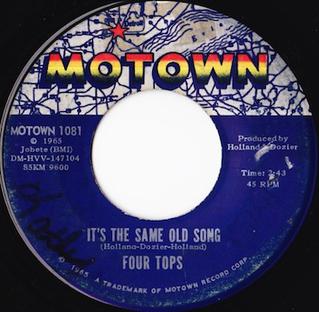
"It's the Same Old Song" was recorded by the Four Tops for the Motown label. It was released in 1965 as the second single from their second album. Written and produced by Motown's main production team Holland–Dozier–Holland, the song is today one of The Tops' signatures, and was reportedly created—from initial concept to commercial release—in 24 hours. It reached #5 on the Billboard Hot 100 and #2 on the Billboard R&B chart. It also reached #34 in the UK.

"Bernadette" is a 1967 hit song recorded by the Four Tops for the Motown label. The song was written and composed by Holland–Dozier–Holland, Motown's main songwriting team, and produced by Brian Holland and Lamont Dozier.

David Brown was an American musician. He was the bass player for the band Santana from 1967 until 1971, then again from 1974 until 1976. Brown played in Santana at Woodstock and at Altamont in 1969 and on the band's first three studio albums before leaving after the "Closing of the Fillmore West" gig on July 4, 1971. In 1974, he rejoined for the album Borboletta and remained with the band for the follow-up Amigos before leaving again in the spring of 1976. In 1998, Brown was inducted into the Rock and Roll Hall of Fame as a member of Santana.
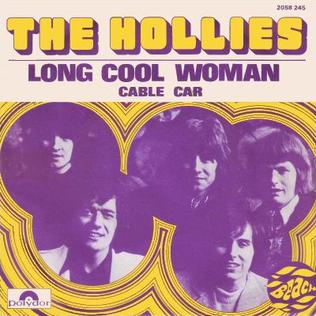
"Long Cool Woman in a Black Dress" (also titled "Long Cool Woman" or "Long Cool Woman (in a Black Dress)") is a song written by Allan Clarke, Roger Cook and Roger Greenaway, and performed by the British rock group the Hollies. In an interview with Johnnie Walker on BBC Radio 2 on Sounds of the 70s in April 2023, Clarke said it had been written by himself and Cook. Cook had a long-standing agreement with Greenaway that any songs written by one of them should be credited to both.

"Crocodile Rock" is a song written by Elton John and Bernie Taupin, and recorded in summer 1972 at the Château d'Hérouville studio in France, where John and his team had previously recorded the Honky Château album. It was released on 27 October 1972 in the UK and 20 November 1972 in the U.S., as a pre-release single from his forthcoming 1973 album Don't Shoot Me I'm Only the Piano Player, and became his first U.S. number-one single, reaching the top spot on 3 February 1973, and staying there for three consecutive weeks. In the U.S., it was certified Gold on 5 February 1973 and Platinum on 13 September 1995 by the RIAA.
"New York State of Mind" is a song written by Billy Joel that initially appeared on the album Turnstiles in 1976. Although it was never released as a single, it has become a fan favorite and a song that Joel plays regularly in concert. Joel famously played the song at The Concert for New York City, the October 2001 benefit concert for the New York City Fire and Police Departments, as well as the loved ones and families of first responders lost during 9/11. He reprised the song and theme, playing it during his set at 12-12-12: The Concert for Sandy Relief at Madison Square Garden in New York City on December 12, 2012, where he changed lyrics to include the likes of "Breezy Point".
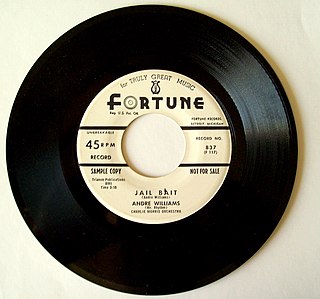
Fortune Records was an American family operated, independent record label located in Detroit, Michigan from 1946 to 1995. The label owners were Jack and Devora Brown, their son Sheldon Brown recorded for the label. Original releases tapered off after 1972 aside from a few albums in the mid-1980s. Fortune specialized in R&B, blues, soul and doo-wop music, although the label also released pop, big band, hillbilly, gospel, rock and roll, and polka records.

"Jungle Boogie" is a funk record by Kool & the Gang from their 1973 album Wild and Peaceful. It reached number four as a single, and became very popular in nightclubs. Billboard ranked it as the number 12 single for 1974, despite as many as 36 No. 1 singles that year.
Jerry Weiss is an American trumpet and flugelhorn player, best known as a founding member of the jazz fusion band Blood, Sweat & Tears. He appeared on their critically acclaimed 1968 debut album, Child Is Father to the Man.

"Running on Empty" is a song by American singer-songwriter Jackson Browne. It is the title track of his 1977 live album of the same name, recorded at a concert at Merriweather Post Pavilion in Columbia, Maryland, on August 27, 1977. A number 11 hit on the US Billboard Hot 100 when it was released as a single, it spent seventeen weeks on the chart after debuting on February 11, 1978 at position 72. Rolling Stone ranked it at number 496 on its list of "The 500 Greatest Songs of All Time" in 2010 and number 492 in 2004 and it is one of Browne's signature songs. "Running on Empty" was most popular in Canada, where it spent two weeks at number four.

"I'm Just a Singer (In a Rock and Roll Band)" is a 1973 hit single by the English progressive rock band the Moody Blues, written by the band's bassist, John Lodge. It was first released in 1972 as the final track on the album Seventh Sojourn and was later released as a single in 1973, with "For My Lady" as its B-side. It was the second single released from Seventh Sojourn, with the first being "Isn't Life Strange", which was also written by Lodge.

"Rock and Roll Never Forgets" is a song written by American singer-songwriter Bob Seger. The song first appeared on Seger's ninth studio album Night Moves (1976). The song was released in early 1977 as the third and final single from the album. The song peaked at No. 41 on the Billboard Hot 100, charting less successfully than the previous two singles. Nevertheless, "Rock and Roll Never Forgets" remains popular with Seger fans, and has become a staple of classic rock radio.

The Beau Brummels, Volume 2 is the second studio album by the American rock group the Beau Brummels. Released in August 1965, the album contains the U.S. top 40 hit "You Tell Me Why" and follow-up single "Don't Talk to Strangers."

"American Storm" is a song written by American singer-songwriter Bob Seger. It was recorded with The Silver Bullet Band and released in March 1986 as the lead single from their album Like a Rock. The single peaked at number 13 on the U.S. Billboard Hot 100 chart and at number 2 on the US Billboard Mainstream Rock Tracks chart.
Let's Go (Pony) is a 1962 song by The Routers. Its infectious “[clap clap clap-clap-clap clap-clap-clap-clap] Let's Go!" chant became a favorite of cheerleaders and football fans worldwide. The musicians were key members of the famous session musicians known as the Wrecking Crew: Earl Palmer (drums), Plas Johnson (saxophone), Tommy Tedesco (guitar), Bill Pitman (guitar), and Jimmy Bond (bass).
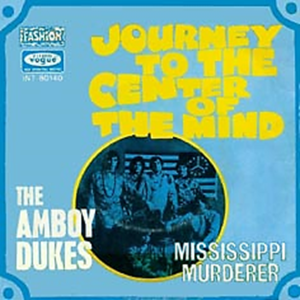
"Journey to the Center of the Mind" is a song released by the Amboy Dukes in June 1968. It reached No.16 on the Billboard charts in 1968 and No.19 in Canada.
Ray Rush is an American songwriter and record producer. After early collaborations with Buddy Holly and Roy Orbison, Rush moved into producing and promoting records of Texas musicians.
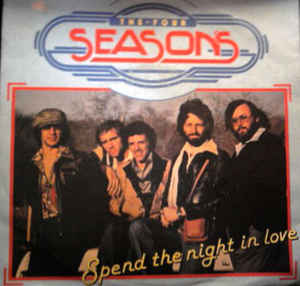
"Spend the Night in Love" is a 1980 song by The Four Seasons. It was composed by Lenny Goldsmith, Bob Gaudio and Judy Parker and produced by Gaudio and longtime Seasons collaborator Charles Calello. The song was the lone single from their album Reunited. The single version is a studio cut; the version on the album, like the remainder of the album, was recorded live on tour.
References
- 1 2 3 "Algora Publishing – Rock -n- Roll Gold Rush A Singles Uncyclopedia". Algora. Algora.com. Retrieved October 30, 2008.
- 1 2 3 4 5 6 7 8 9 10 Hanc, John (September 1, 2022). "Ex-professor writes book about the Long Island running scene". Newsday .
- ↑ "Online Bookstore: Books, NOOK ebooks, Music, Movies & Toys".
- ↑ "Welcome to Greater Patchogue Historical Society".